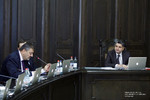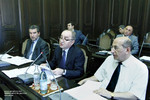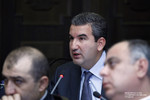Thursday, 6 September 2012
Prime Minister’s Focus on a Number of Important Issues
PM Tigran Sargsyan: Hello, dear colleagues. We have eight months’ results of key indicators. Mr. Gabrielyan will now present the key performance indicators of the state budget.
RA Minister of Finance Vache Gabrielyan: Thank you, Mr. Prime Minister. Regarding the budget execution, our state budget revenues from January to August 2012 amounted to 576 billion 156 million AMD, including taxes, duties and other social payments. The results of these eight months period exceeded our initial goal with more than 4 billion drams. We registered 390 million AMD revenues in August only. These results are consistent with our economic activity, which means, in the fourth quarter the revenues will be even higher.
It should be noted that the execution of the budget in terms of revenue has been carried out according to the plan, and there is every reason to insist that it is realistic and will be executed. As for the expenses, in January-August they amounted to 574 billion 148 million AMD, 72 billion 232 million AMD in August only. If we continue at this rate, towards the end of the year the deficit will be lower than planned. We can’t tell the full PIU data now, but we predict that at the end of the year the deficit will be lower than the expected 132 billion AMD. Thus, we can say that as far as the budget execution goes, there are no unpaid commitments and at the same time, the revenues are higher than expected.
PM Tigran Sargsyan: Very good. Dear colleagues, I would like to address the Global Competitiveness Report, which was published yesterday. According to the report, Armenia recorded significant improvement; we have improved our position by 10 places compared to the previous year’s report. However, I think that we can’t be satisfied with this result, because a detailed analysis of the report shows that we still have a lot of work to do to fill the gaps. At the same time, the report contains quite strange estimations, particularly, regarding the IT and Internet accessibility. It is unclear why the authors of the report used the 2009 database, especially when last year we touched upon this issue and punished the Transport and Communication Ministry officials for not providing the necessary information, but I have been informed that this year the websites were updated with all the required information. This rate essentially worsened our position, due to the fact that the indicators used by the authors were of 2009. Mr. Nazaryan, I’d like you to present our indices in this field.
President of the RA Public Services Regulatory Commission Robert Nazaryan: Thank you Mr. Prime Minister. I don’t understand either why the report included numbers, which didn’t correspond to our indices in 2011. In 2011-1012 Global Competiveness Report we have the following estimates for the information and communications technologies: Armenia has registered significant progress in the fields of mobile and Internet communications. The rapid developments due to the intense competition in telecommunications stimulated Armenia’s competitiveness in this field. In the recent report of the International Telecommunication Union Armenia’s information and communications technologies field is classified as one of the most dynamically developing.
For mobile communications subscriptions per 100 people Armenia ranks 33rd, Azerbaijan ranks 75th and Georgia ranks 104th. For Internet users per 100 people Armenia is 68th, Azerbaijan 73rd and Georgia is 85th.
The report says that Armenia has improved its position by all the infrastructural indexes. In the last three years the number of mobile phone subscribers has tripled: from 1.2 million in 2007 to 3.3 million in 2012. There has been an unprecedented progress in the field of web services; in particular, there has been a fourfold increase in the number of the Internet users in the last for years.
Armenia is the regional leader. On the level of Internet usage Armenia has an index of 37%, Azerbaijan 36%, Georgia 17% and CIS average countries 29%.
2011-2012 report says that they had used the data for 2009. The Ministry of Transport and Communications tried to find out if they received the data we’d sent them, but all of the required information was available in the official bulletin. The Ministry conducted an official inquiry to ITU in order to understand why they’d used the 2009 data. If they’d taken the results for 2011, I am confident that our progress would have been higher.
PM Tigran Sargsyan: Very good. Mr. Beglaryan, it would be better if you started an investigation to find out why the International Union had the data for 2009 if, as you said, the Ministry had provided the data for 2011 in time. We have to understand where we went wrong.
RA Minister of Transport and Communications Gagik Beglaryan: We have already started one, Mr. Prime Minister.
PM Tigran Sargsyan: Dear colleagues, among the 144 countries we have moved from 92nd place to 82nd. Surely this can’t satisfy us. Our main shortcomings lie in the intensity of local competition, business education standards, the burden of customs procedures, foreign markets index, the effectiveness of antimonopoly policy, financing through local equity market index, the quality of scientific research, the expenses for the companies’ researches and development, independence of judiciary system and effectiveness of corporate boards. These have the worst indices, and competition and competitiveness have the most important indicators. Mr. Shaboyan, what do your analyses show?
Chairman of the Armenian State Commission for Protection of Economic Artak Shaboyan: Thank you, Mr. Prime Minister. In the Global Competitiveness Report three indicators were separated to describe the competition field. The first indicator is the impact of dominant positions on the competition. I must say that we have made quite serious progress in this direction: we moved forward by 43 points.
When we compare this result with other countries, we see that our neighboring Georgia went back by 9 points and Russian by 6 points. Comparing with the countries of Eastern Europe we see that many countries have also moved backwards, in particular Hungary, which moved back by 29 points. I have to say that among the 144 countries, Armenia recorded the highest progress, we have moved forward by 43 points.
The second indicator relates to the strength of the antimonopoly policy and the effectiveness of antimonopoly authority. With this one we moved forward by 23 points, while our neighboring Azerbaijan and Georgia moved backwards. Among the CIS countries, Russian registered the largest regression by moving backwards by 13 points.
The third is the indicator of the intensity of competition in the domestic market. With this we moved forward by 9 points. Azerbaijan and Georgia made progress, too, but a very small one at that. They moved forward by only 1 and 2 points respectively.
I have to say that with these indicators Armenia has only registered regression in the previous years. This is the first year that we made progress and the statistics show that our progress is significant.
PM Tigran Sargsyan: Of course, moving upwards by 10 places is very important, but I repeat, it should not be enough for us. Armenia’s competiveness is estimated 110 points, which means all the Ministries have work to do. I assign the Heads of the Departments to take control of their indices. What measures do we need to implement to improve the competitiveness in Armenia? There are indicators that include us in the world’s 40 most competitive countries, but there are also indicators where we are unfortunately ranked only 120th – 130th. This can’t be acceptable for us. I ask you to focus on the measures that should be implemented to improve this index.
President of the RA Public Services Regulatory Commission Robert Nazaryan: Mr. Prime Minister, I have a suggestion. There is a point among the indices sent to ITU, which refers to the number of Internet users. Our functions enable us to provide the number of the subscribers, but it is necessary to develop a method to be able to clarify the number of Internet users. I want you to instruct the Ministry of Transport and Communications and the Statistical Service of Armenia to develop a method which will give us a better understanding of these facts.
PM Tigran Sargsyan: Very good, a protocol decision will be submitted today. The third issue is the food safety and quality. We have already discussed this matter once when the food safety service carried out inspections and found simply intolerable flaws. The service was given instructions to punish the companies that provide the customers with hazardous food. These companies were discovered through the conducted laboratory examinations. We gave them time, saying that in September 2012, we would publish the types of unsafe products and the enterprises that provide the customers with them. The customers have the right to know about these companies and their products. Mr. Bakhchagulyan, we can now publish the results of your examinations for the first time.
Head of State Food Safety Service Abram Bakhchagulyan: Mr. prime Minister, dear colleagues, State Food Safety Service conducted studies in the distribution networks and warehouses of the entities engaged in the production of dairy products. We sent samples of pasteurized and raw milk to the laboratories and asked them to carry out examinations to find out if the products contained alkali, vegetable oil or milk powder. The examination showed that the milk produced by 7 of the total 11 companies contained alkali. The companies are: “Ani Tamara”, “Biokat”, “Dustr Marianna”, “Ashtarak Kat”, “Multi Agro”, “Tamara” and “Arzni Tohmayin TKHT”. Currently inspections are being carried out in the listed companies to find out at what stage of production alkali was added to the milk, because the economic entities insist that it’s not them who add alkali to the milk, but the companies who store their raw product. However, we examined samples of raw milk, too and didn’t find alkali in it. I must say that the technical regulations of pasteurized milk do not allow the presence of alkali in it, because alkali reduces the acidity of the milk and makes it get spoiled sooner than intended. We have also conducted sampling and laboratory examinations of sour cream, to find out if it contained milk powder. The results showed that the products of the 3 companies contained milk powder, however, I have to say that the law “On Food Safety” does not prohibit its use in sour cream products, but the companies have to note about it in the labeling. Milk powder was found in the products of “Ani Tamara” and “Dustr Marianna”, but the study showed that these companies did note about the milk powder on the labeling of their products. Milk powder was also found in the products of “Multi Agro”, where a note about it was absent in the labeling.
We also conducted laboratory examinations to find out if vegetable oil was used in dairy products and found its presence in the sour cream produced by “Arzni Tohmayin TKHT”. Milk and dairy technical regulation does not allow the usage of vegetable oil in sour cream products, because the latter is a product of animal origin. Currently inspections are being carried out in all the listed 7 companies.
PM Tigran Sargsyan: Does the usage of milk powder reduce the cost of the products?
Head of State Food Security Service Abram Bakhchagulyan: Mr. Prime Minster, the problem with the milk powder is that the companies can store it and not worry that it will get spoiled, whereas milk gets spoiled easily. In other words, milk powder is a long-term preservation product and milk is a short-term preservation product. The economic entities store the milk during its overproduction, turn it into milk powder and keep it for later use.
PM Tigran Sargsyan: I want to understand why the companies don’t announce about it, if it’s permitted by the law. This is a violation of rules and dishonesty towards the customers. That is, when buying sour cream the consumers read the label and see that it’s produced of milk, when in reality it’s produced of milk powder. What’s the point of cheating?
Head of State Food Security Service Abram Bakhchagulyan: The point is to mislead the customers. Last year we found out that “Dustr Marianna” and “Ani Tamara” used milk powder in their products. These companies have already corrected their mistakes and during our meeting I tried to find out whether the consumption was cut down due to true labeling. The representatives of the both companies claimed that the consumption had not been reduced, because the Armenian consumer does not usually read the labeling on the products. However, there is concern that if it were announced that the companies used milk powder instead of milk, the consumption volumes would decrease.










